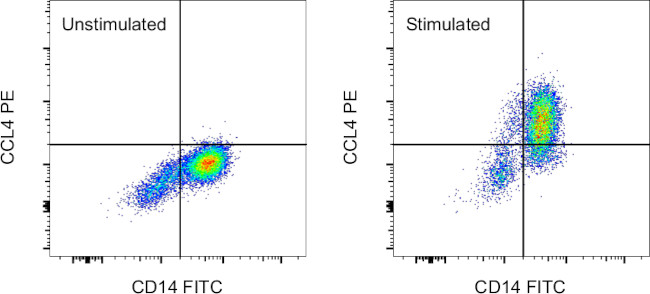Search Thermo Fisher Scientific
Invitrogen
CCL4 (MIP-1 beta) Monoclonal Antibody (FL34Z3L), PE, eBioscience™
FIGURE: 1 / 1
CCL4 (MIP-1 beta) Antibody (12-7540-42) in Flow

Product Details
12-7540-42
Species Reactivity
Host/Isotype
Recommended Isotype Control
Class
Type
Clone
Immunogen
Conjugate
Excitation/Emission Max
Form
Concentration
Purification
Storage buffer
Contains
Storage conditions
Shipping conditions
RRID
Product Specific Information
Description: This FL34Z3L monoclonal antibody reacts with human CCL4. CCL4, also known as MIP-1 beta (Macrophage Inflammatory Protein 1 beta), is a member of the CC- subfamily of chemokines and is most closely related to CCL3, or MIP-1 alpha. These proteins play critical roles in the recruitment of leukocytes to the site of inflammation. While both CCL3 and CCL4 are chemoattractant for monocytes, macrophages, and dendritic cells, CCL4 preferentially attracts CD4+ T cells, while CD8+ T cells are more responsive to CCL3. In addition to its chemotactic functions, CCL4 induces the release of proinflammatory cytokine, mast cells degranulation, and NK cell activation.
CCL4 signaling is mediated by the G protein-coupled receptors CCR1, CCR4, and CCR5, which are shared with CCL3 and CCL5 (RANTES). CCR5 is the primary co-receptor for HIV entry, which the virus binds through the gp120 envelope protein. All CCR5 ligands demonstrate potent inhibition of virus entry into the cell, both through steric hindrance of gp120-CCR5 interaction, and ligand-mediated receptor internalization.
Applications Reported: This FL34Z3L antibody has been reported for use in surface and intracellular staining followed by flow cytometric analysis.
Applications Tested: This FL34Z3L antibody has been pre-diluted and tested by intracellular staining followed by flow cytometric analysis of stimulated normal human peripheral blood cells using the Intracellular Fixation & Permeabilization Buffer Set (Product # 88-8824-00) and protocol. Please refer to "Staining Intracellular Antigens for Flow Cytometry, Protocol A: Two step protocol for intracellular (cytoplasmic) proteins" located at www.thermofisher.com/flowprotocols. This may be used at 5 µL (0.125 µg) per test. A test is defined as the amount (µg) of antibody that will stain a cell sample in a final volume of 100 µL. Cell number should be determined empirically but can range from 10^5 to 10^8 cells/test.
Excitation: 488-561 nm; Emission: 578 nm; Laser: Blue Laser, Green Laser, Yellow-Green Laser.
Target Information
CCL4 (macrophage inflammatory protein 1-beta, MIP1B) belongs to the intercrine beta (chemokine CC) family. Functionally, CCL4 is involved in chemotactic and proinflammatory effects, and homeostasis. CCL4 is produced by macrophages upon stimulation by bacterial endotoxins. CCL4 recruits and stimulates various inflammatory cells at sites of inflammation. CCL4 is produced by lymphocytes, macrophages and dendritic cells. Both CCL4 and the related protein CCL3 participate in the host response to invading bacterial, viral, parasite and fungal pathogens by regulating the trafficking and activation state of selected subgroups of inflammatory cells. While both CCL4 and CCL3 exert similar effects on monocytes, their effect on lymphocytes differ, with CCL4 selectively attracting CD4+ lymphocytes and CCL3 selectively attracting CD8+ lymphocytes. Additionally, both have been shown to be potent chemoattractants for B cells, eosinophils and dendritic cells. The processed form of CCL4 can induce down-modulation of surface expression of the chemokine receptor CCR5, thus inhibiting the CCR5-mediated entry of HIV-1 in T cells. CCL4 binds with high affinity to CCR5 receptors.
For Research Use Only. Not for use in diagnostic procedures. Not for resale without express authorization.
How to use the Panel Builder
Watch the video to learn how to use the Invitrogen Flow Cytometry Panel Builder to build your next flow cytometry panel in 5 easy steps.
References (0)
Bioinformatics
Protein Aliases: ACT-2; C-C motif chemokine 4; chemokine (C-C motif) ligand 4; G-26 T-lymphocyte-secreted protein; HC21; LAG-1; Lymphocyte activation gene 1 protein; Macrophage inflammatory protein 1-beta; MGC104418; MGC126025; MGC126026; MIP-1-beta; MIP-1-beta(1-69); MIP1-beta; MIP1beta; PAT 744; Protein H400; RP23-320E6.8; secreted protein G-26; SIS-gamma; small inducible cytokine A4 (homologous to mouse Mip-1b); Small-inducible cytokine A4; T-cell activation protein 2
Gene Aliases: ACT2; AT744.1; CCL4; G-26; HC21; LAG-1; LAG1; MIP-1-beta; MIP1B; MIP1B1; SCYA2; SCYA4
UniProt ID: (Human) P13236
Entrez Gene ID: (Human) 6351

Performance Guarantee
If an Invitrogen™ antibody doesn't perform as described on our website or datasheet,we'll replace the product at no cost to you, or provide you with a credit for a future purchase.*
Learn more
We're here to help
Get expert recommendations for common problems or connect directly with an on staff expert for technical assistance related to applications, equipment and general product use.
Contact tech support

